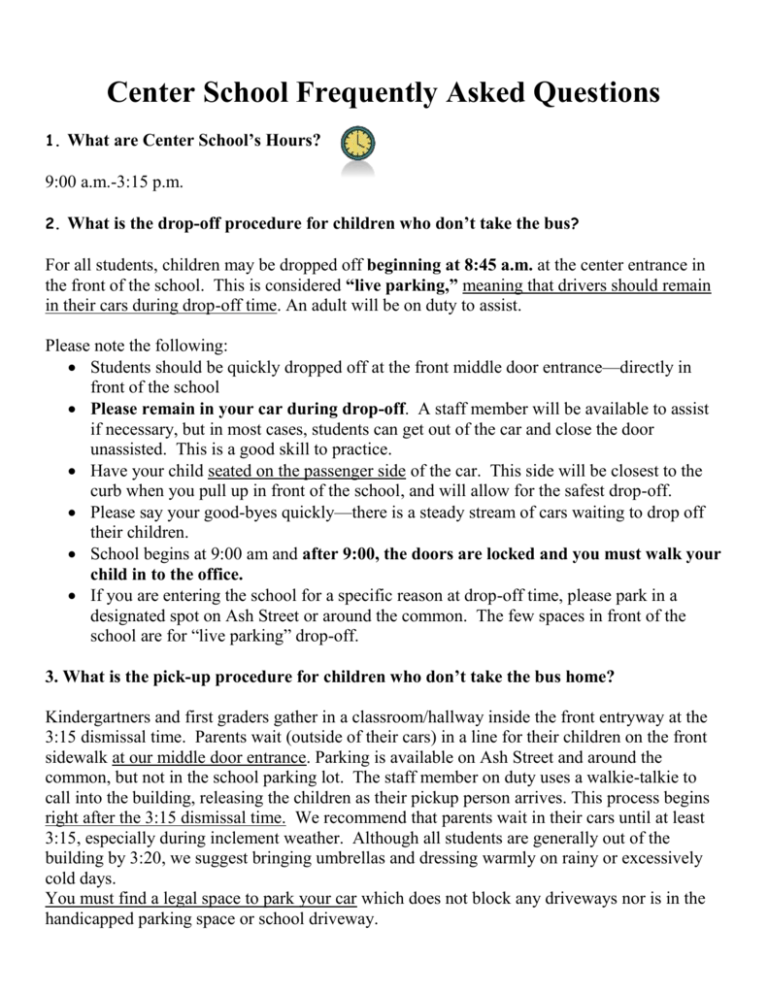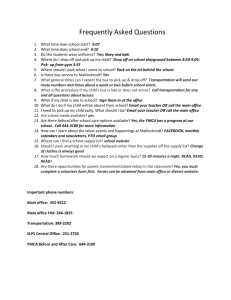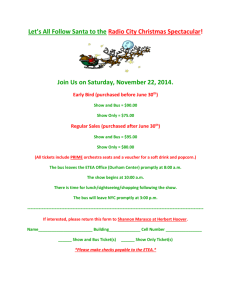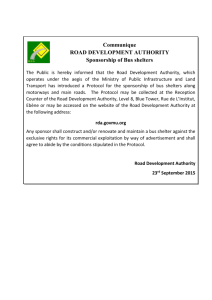Center School Frequently Asked Questions
advertisement

Center School Frequently Asked Questions 1. What are Center School’s Hours? 9:00 a.m.-3:15 p.m. 2. What is the drop-off procedure for children who don’t take the bus? For all students, children may be dropped off beginning at 8:45 a.m. at the center entrance in the front of the school. This is considered “live parking,” meaning that drivers should remain in their cars during drop-off time. An adult will be on duty to assist. Please note the following: Students should be quickly dropped off at the front middle door entrance—directly in front of the school Please remain in your car during drop-off. A staff member will be available to assist if necessary, but in most cases, students can get out of the car and close the door unassisted. This is a good skill to practice. Have your child seated on the passenger side of the car. This side will be closest to the curb when you pull up in front of the school, and will allow for the safest drop-off. Please say your good-byes quickly—there is a steady stream of cars waiting to drop off their children. School begins at 9:00 am and after 9:00, the doors are locked and you must walk your child in to the office. If you are entering the school for a specific reason at drop-off time, please park in a designated spot on Ash Street or around the common. The few spaces in front of the school are for “live parking” drop-off. 3. What is the pick-up procedure for children who don’t take the bus home? Kindergartners and first graders gather in a classroom/hallway inside the front entryway at the 3:15 dismissal time. Parents wait (outside of their cars) in a line for their children on the front sidewalk at our middle door entrance. Parking is available on Ash Street and around the common, but not in the school parking lot. The staff member on duty uses a walkie-talkie to call into the building, releasing the children as their pickup person arrives. This process begins right after the 3:15 dismissal time. We recommend that parents wait in their cars until at least 3:15, especially during inclement weather. Although all students are generally out of the building by 3:20, we suggest bringing umbrellas and dressing warmly on rainy or excessively cold days. You must find a legal space to park your car which does not block any driveways nor is in the handicapped parking space or school driveway. 4. How are dismissal changes communicated to the school? Children typically have a standard dismissal procedure. For many children, this means taking the bus to and from school every day. For some children, it may mean taking the bus some days, and having a standing note (parents provide this to the main office) to be picked up on certain days of the week. When this standard dismissal procedure needs to change (for example, a bus student needs to be picked up by a parent) you must send a note with your child informing us of this change. Notepads called “A Note from Home” can be purchased through the HPTA at Action Copy or downloaded from the HPTA website. We prefer you to use these formatted notes when informing us of a dismissal change. Please make sure to include your child’s first name, last name, and room number. Children turn in notes to their teacher, and the teachers send the notes to the office. You may also send an email to:coffice@hopkinton.k12.ma.us informing us of a dismissal change. Changes to the standard dismissal procedure will not be made without written notification. Without a note, your child will be sent home on his/her regularly scheduled bus. ***We will not accept dismissal changes after the following times: Daily - 2 p.m. Early Release Days – 11 a.m. Also, please note that dismissals that occur any time before 3:15 are considered “early dismissals” and are noted on your child’s report card. 5. What is the difference between an Early Release Day and an Early Dismissal Day? It is important to check your school calendar or the district website for these dates, and we recommend marking your calendars at home. Early Release Days occur twelve times throughout the school year and students are dismissed at 1:00 pm. An Early Dismissal Day occurs the day before Thanksgiving and typically on the last day of school. Please note the differences: Early Release Days: 9 a.m. – 1 p.m. On Early Release Days, all students are dismissed at 1 p.m. Lunch is served and the typical school lunch can be purchased on these days. Early Dismissal Days: 9 a.m.-12:05 p.m. Early Dismissal occurs on the Wednesday before Thanksgiving. All students are dismissed at 12:05 p.m. Lunch is not served on early dismissal days. 6. How are student absences reported? Please call the nurse’s line at 508-497-9876 to report your child’s absence, or to report that your child will be late (if you have an early morning appointment, for example). It is important for you to call in your child’s absence/tardiness otherwise our school nurse will be contacting you to verify your child’s absence. Please try to call in early; you may leave a voice mail message on the nurse’s line. 7. How does lunch work? Students eat lunch daily in the cafeteria. They have a thirty-minute lunch period, followed by a fifteen-minute recess. Students have the opportunity to purchase the school lunch or to bring their own lunch from home. Milk may be purchased as well. Lunch prices for 2015-2016 are: Lunch: $2.50 Milk: $0.50 Lunch and milk may be prepaid by writing a check to: Hopkinton School Lunch Program. You may also prepay online – please refer to our website. 8. How can I get important information about Hopkinton Public Schools? Information about all schools and about the school district is available on the Hopkinton Public Schools website as well as the individual school websites. The Elementary Family Handbook is also available on the website and contains important facts about the elementary schools and its policies. 9. What should I do when my child is not attending school due to illness, or when my child is taking medication? Please inform the school of any allergies or any other medical problems. Every effort should be made to give medication at home before and/or after school. Medicine that must be administered at school can only be done so with written physician and parental permission, and the medicine must be in the original prescription bottle or the over-the-counter container. It must be delivered to school by a parent—children may not carry their own medication. If your child will be absent for a prolonged period of time due to illness (or other emergency situation) please notify the school. Also, if your child has a contagious disease (e.g. chicken pox) the school nurse must be notified. Strep infections are considered communicable and need to be reported as well. When a child has a positive throat culture, he or she must receive antibiotic treatment for twenty four hours prior to returning to school, and children should remain at home until throat culture results are received. A call-in system for absences is in place at Center School; please call 508-497-9876 each day that your child will be absent from school. While we want children to be in school each day, please keep your child at home if he or she is uncomfortable or contagious—this helps prevent the spread of germs throughout the building. 10. May parents volunteer at Center School? Yes! There are opportunities for parents to volunteer at Center School. Some of the opportunities are in your child’s classroom, but please note that the type/amount of volunteer opportunities varies by class, as well as by need and parent interest. Volunteering can also take the form of working on important projects at home or donating—sending in a roll of paper towels or other items that the teachers may request is another important way you can support your child’s class, and is often a viable option for parents whose work schedules prohibit “in person” volunteering. Please know that you may not volunteer in the classroom or at school without being CORI cleared. This also applies to being a “mystery reader” in your child’s classroom. Please see our website for further details. 11. Will my child have special subjects? In kindergarten, your child will have two sessions of physical education, two sessions of library and one session of music. In first grade, your child will have six forty-minute specials each week. They include: art, music, health, library, and two sessions of physical education. 12. Can I bring electronics to school? Are there any restrictions as to what my child can bring to school? And, what if my child loses his or her belongings? Students should not bring any electronic games, cell phones, or valuable items to school. Center School has a lost and found in the school’s cafeteria. Please make sure to LABEL all lunch boxes, backpacks, boots, and articles of clothing that may be removed in school. Please do not allow your child to bring important and/or meaningful items to school, as it becomes very difficult when they are lost or misplaced. Pokemon cards are not allowed at school or on the bus. 13. Will my child be able to bring a snack? Children should bring their own healthy snack each day. Please send just one item to eat and one item to drink. We recommend something small, nutritious and not too time consuming. We strongly discourage snacks of cookies and chips. Small bottles of water are great. Also, when considering a snack, please don’t send foods that are sticky or that make a mess (like Cheetos, which rub off on everything). We ask that you keep the snack more like a snack instead of a meal! 14. How can I communicate with my child’s teacher? All Center School staff members can be contacted by phone or e-mail. Typically, e-mail is the most efficient means of communicating with Center School teachers as availability during the day is extremely limited. It may also be more convenient to set up a phone call time via email. Your child’s teacher will address home/school communication at the Open House night. 15. Should my child carry a backpack? Many Center School children carry their belongings to and from school in a backpack. This works well for most of our students. When choosing a backpack, please choose a lightweight style, preferably without wheels. The wheels can become a safety hazard on the bus and school stairs. Please note that there may be no hanging objects on the outside of the backpacks. It is a safety hazard when travelling on the bus. 17. What should I do if I can’t find an answer to one of my questions? In our experience, most of your questions can be answered through the family handbook, through our website, by your child’s teacher, our front office staff, or our school nurse. If for any reason you have a lingering question and aren’t sure where to turn, feel free to send your question to: askcenterschool@hopkinton.k12.ma.us. You will receive a response that either directly answers your questions or directs you to the appropriate resource. Foot Wear and Clothing Expectations Sneakers that cover the entire foot provide the most protection for stairs, PE, using playground equipment, and running in the field. Sneakers are required for physical education. Students may not wear: FLIP FLOPS, open-toe sandals, and wheelies are not allowed at school. Crocs are strongly discouraged as they have a slippery surface. Many of the current shoe styles have slippery soles. Children are expected to wear clothing that does not interfere with learning. Clothing should not have inappropriate graphics or words and should be age appropriate. Clothing should be comfortable for moving around (gym and recess) and working on the floor (circle time, stories, projects) Hats may not be worn in the building (but may be worn at recess) Sneakers are required on physical education days and recommended on an everyday basis. Playground surfaces are blacktop, sand, and mulch. Special attention to shoe choice is suggested. Because mulch chips can hurt, sandals and clogs (or shoes with heels) are not advised. Similarly, this type of shoe can make running difficult and possibly hazardous. Dress for the weather. It is easier to take off extra clothing if warm. We encourage parents to help children make good choices for clothing to be worn to school. School clothes may differ from play or weekend clothes. Please note that children go outside for recess on most days unless it is raining, extremely cold and icy, or our blacktop is not clear. Mittens and hats should always be included in the cold months and snow gear is expected for recess (see playground rules). Bathroom Expectations Children should follow classroom rules regarding trips to the bathroom. Quiet voices are expected in the bathrooms – no yelling or screaming. Children must wash their hands after using the bathroom and USE SOAP. Faucets should be turned off when children are finished. The bathroom is not a time to visit with friends or classmates. If a child sees something in the bathroom that should not be happening, he or she should tell the classroom teacher or an adult. Please show your child how to properly wash his/her hands with soap and watch them practice this at home. Our school nurse recommends washing while saying the ABC’s so your child knows how long he/she must wash to get his/her hands clean. Bathroom routine practiced at school is: GO WASH FLUSH LEAVE Center School Bus Expectations Center School students are expected to treat each other and the bus driver respectfully. The safety of all students is our main concern. Riding the bus to and from school is a privilege and may be suspended or revoked for inappropriate behavior. Cooperation is expected as we try to make the ride a safe and pleasant trip for all students. The following list outlines Center School’s behavior expectations for the school bus: The school bus driver is in full charge of the bus and students. Children will follow all directions given by their driver, the first time they are given. All Center School kindergarten and first grade students must sit in the front of the bus at all times-no exceptions. All children must be seated for the bus to be in motion. Children will choose a seat quickly, orderly, and safely. They may not save seats or deny anyone the chance to sit next to them (or in a particular seat). Children must remain in their seat throughout the entire bus ride. There is no seat changing (even when the bus stops to drop off other students). Children must sit flat on the bottom of the seat, facing forward, with their feet in front of them. Teasing, hitting, yelling, or any other type of disruptive behavior is never permitted on the bus. Children will keep their feet, arms, and backpacks out of the aisle. Backpacks may not have any novelties hanging off of them due to safety reasons. Children must keep their heads, arms, and hands within the bus at all times. Nothing may be thrown inside the bus or outside the bus windows. When the bus stops to drop off students, all others must remain in their seats. Eating and drinking are not permitted on the bus. Toys (including balloons) are not allowed on the bus. Valuable and/or meaningful personal possessions are discouraged. POKEMON cards are not allowed on the bus. Drivers and school personnel may assign students a designated seat. The Bus Rules and Behavioral Expectations on the next page are posted on each bus. Bus Rules & Behavioral Expectations The bus driver is in full charge of the bus and students Listen and obey the rules and directions of the driver Stay in your seat the entire ride- must be seated* No changing seats at any time Use a safe, reasonable voice No food, drink, or gum Items that need to be brought to school must stay zipped in backpacks- no toys Speak politely and use appropriate language Be respectful- seat space is shared Please see family handbook for a complete list of expectations. *Students may be assigned a seat as needed. Food in the Classroom All of Hopkinton’s elementary schools will follow consistent practices regarding food in the elementary classrooms. These changes adhere to the district’s Wellness Policy, which was developed by a broad-based committee representing all school levels, parents, administration, (including the School Committee) and business representatives as a result of a federal mandate. Food will not be served to a whole class unless it is integral to the learning, such as fruit when learning about food groups or sampling foods from a country currently being studied in social studies. Food should be limited at whole class celebrations and if food is made available, it should be purposeful. Food will not be used as a reinforcer unless included in a student’s individual education plan. Birthday Celebrations Birthdays will be recognized in the classroom; however, food will not be involved in the recognition of birthdays. Classroom teachers may use their discretion as to how they will celebrate birthdays, i.e. sing Happy Birthday, line leader, special chair, birthday crown, special story from home, etc. Please check with your child’s teacher ahead of time for specifics. Please do not send birthday invitations to school with your child for distribution. All children pick out a special birthday pencil in the office on his/her birthday and we always include summer birthdays.






